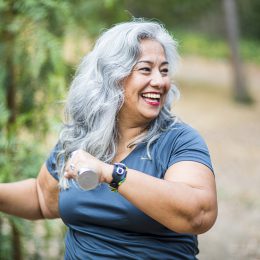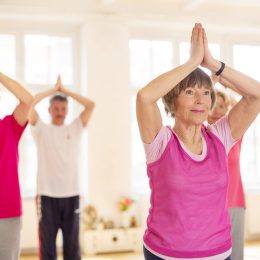5 Ways to Sharpen Your Senses
Certain exercises can improve your hearing, sight, smell, and more. Here’s your sensory-boosting plan.

You know that exercise is good for your heart, waistline, and mood, but did you know it can also help your hearing?
Regular aerobic exercise keeps your ears in top form by improving your blood circulation. And that’s not the only way staying active affects your sensory system.
Here’s how you help your five senses each time you slip on your sneakers or step onto a yoga mat.
Do This to Boost … Smell
Research suggests that your sense of smell improves for a short time after walking briskly or doing aerobic exercise.
“The reason for this is likely due to increased blood flow in the nasal passages that helps to clear odor molecules so that we regain sensitivity faster,” says Pamela Dalton, Ph.D., M.P.H., a scientist at the Monell Chemical Senses Center in Philadelphia. “A few perfumers have told me that when their noses ‘tire’ from smelling, they often run up and down a few flights of stairs, and that helps to regain their sensitivity.”
However you choose to stay in shape, keeping up the habit regularly as you get older will benefit your sense of smell for the long term. A recent study found that people between ages 68 and 99 who exercised at least once per week showed less decline in their sense of smell over a 21-year follow-up.
Want to exercise for free? With SilverSneakers, you can take fun classes led by certified instructors or work out on your own at more than 14,000 gyms and fitness locations across the nation. Check your eligibility or find a location here.
Do This to Improve … Touch
Yet another reason to give tai chi a try: Harvard researchers found that people who regularly practice tai chi have better sense of touch, likely because they focus on their hands and fingertips while they move.
If you already practice tai chi and haven’t consciously focused on your fingertips, don’t worry—you may still see improvements to your sense of touch.
“Certainly practitioners do focus on their hands, feet, posture, and breath,” says Roger Jahnke, director of the Institute of Integral Qigong and Tai Chi in Santa Barbara, California. “But practitioners not only focus on what they’re doing, they’re also disassociating from everything else,” he says. “Tai chi and qigong are very engaging. Thus, when they do the practice, they are free of the compromising neurological and physiological effects of the complexity of life.”
Want to give it a try? SilverSneakers FLEX offers a wide variety of classes, including tai chi.
Do This to Enhance … Sight
When you stare at a computer or digital screen, you blink less frequently, which leads to problems like dry, strained eyes and blurry vision. There’s actually a name for it: computer vision syndrome, or CVS.
But according to a study in Head and Face Medicine, a regular yoga practice may help.
“Yoga puts people into a relaxed state that’s associated with blinking more often, which can combat the effects of CVS,” says study author Shirley Telles, M.B.B.S., Ph.D., director of the Patanjali Research Foundation in Haridwar, India. What’s more, “breathing—especially a slow exhalation like you do in yoga—reduces overall arousal, which affects tear formation,” Dr. Telles says.
The American Optometric Association recommends a “20-20-20” rule to combat CVS-related eye strain: You should look up from your screen every 20 minutes for 20 seconds to focus on something that’s 20 feet away. Practicing yoga can make this easier to do, Dr. Telles says.
How? A regular yoga practice may train your eyes “to relax more overall and gaze away from the screen, confident they can get back to their earlier level of attention and performance,” she says.
This yoga flow for older adults can help you increase flexibility, build strength, and practice your gaze. You can also check out SilverSneakers Yoga or yoga classes through SilverSneakers FLEX.
Do This to Refine … Taste
Do your favorite foods suddenly taste bland? It’s true that we have fewer and smaller taste buds as we age, but don’t resign yourself to flavorless meals just yet.
Research shows that a decreased sense of taste is often due to a decreased sense of smell. The great news is if you’re exercising for your nose (see above), you’re automatically helping your taste buds too.
Subscribe to our newsletter
It's quick and easy. You could be one of the 13 million people who are eligible.
Already a member? Click to discover our 15,000+ participating locations.
Follow Us
Other common culprits include medication side effects, chewing problems, and oral disease. Luckily, your doctor and dentist can often help with these challenges. If you take medication, especially if you take multiple medications, and notice a change in how food tastes, let your doctor know. Similarly, if you experience tooth pain, bleeding gums, or frequent bad taste in your mouth, or your dentures don’t fit like they used to, check in with your dentist.
Another great way to perk up your taste buds: Experiment with new foods and flavors. Try a new fruit or vegetable each week, or trade refined grains for more flavorful quinoa, barley, or freekeh. Plus, keep these recipes for six spice blends and five marinades handy so you can transform simple, wholesome ingredients into appetizing meals fast.
Do This to Upgrade … Hearing
A study from Miami University in Oxford, Ohio, found that people who regularly exercised on stationary bicycles for two months improved their hearing ability.
Not a fan of the bike? No problem. The researchers say walking, running, doing aerobics, or participating in other activities that get the heart pumping can have positive effects on hearing.
“We think the mechanism has to do with improved cardiovascular health-related fitness,” says study author Helaine Alessio, Ph.D., chair of kinesiology and health at Miami University. “And we have research that shows this is generally the case over the life span.”
While this particular study focused on cardio, Alessio says a combination of strength training and endurance exercise is best for keeping your hearing sharp. It doesn’t matter if you do them together in the same exercise session or on alternate days. The key is that doing both is better than strength training or endurance exercise alone.
Check out these resources to keep all your senses sharp—and your body strong:
- 9 Ways to Kick Up Your Walking Workout
- Everything You Need to Know About Strength Training
- The 10-Minute Seated Core Workout
- Why SilverSneakers Members Love Our Classes
Take Your Favorite SilverSneakers Classes Online!
SilverSneakers members can access live fitness classes and wellness workshops through SilverSneakers LIVE. See the latest schedule and RSVP for classes here.
Not a member? If you have a Medicare Plan, it may include SilverSneakers—at no additional cost. Check your eligibility instantly here.





